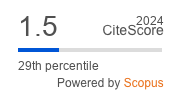Exploring the Design of Transitional Hybrid User Interfaces
DOI:
https://doi.org/10.5753/jis.2011.562Abstract
The idea of hybrid user interfaces (HUI) does not rely only on the use of different devices but also on different interactive environments with the goal of bringing together the advantages of each environment. The main challenge regarding the development of such systems is to know which are the design aspects that should be taken into account in order to promote smooth and continuous interactions. In this way our work reinforces the importance of interactions continuity and dimensional task congruence as design principles to guide the development and interaction analysis within HUI. An example scenario was conceived from splitting a previous single desktop application for 3D volume sculpture into three different interactive environments (Wimp, Augmented Reality and Head-Mounted Immersive Virtual Reality). To achieve such goal we employ the OpenInterface platform to allow the management of several modalities for user interaction within and along the three environments. Finally, we discuss the outcomes of the analysis of interactions within our HUI according to the design principles proposed.Downloads
Download data is not yet available.
Downloads
Published
2011-05-20
How to Cite
CARVALHO, F.; TREVISAN, D. G.; RAPOSO, A.; FREITAS, C. M.; NEDEL, L. Exploring the Design of Transitional Hybrid User Interfaces. Journal on Interactive Systems, Porto Alegre, RS, v. 2, n. 1, 2011. DOI: 10.5753/jis.2011.562. Disponível em: https://journals-sol.sbc.org.br/index.php/jis/article/view/562. Acesso em: 31 jan. 2026.
Issue
Section
Regular Paper
License
JIS is free of charge for authors and readers, and all papers published by JIS follow the Creative Commons Attribution 4.0 International (CC BY 4.0) license.








